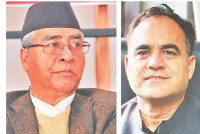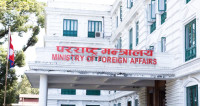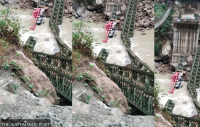National
Ministry asks offices to favour state media
The Ministry of Communication and Information Technology has urged all the government entities to prioritise state-owned media while distributing information and selling advertisements in order to support and help sustain government publications.
Anil Giri
The Ministry of Communication and Information Technology has urged all the government entities to prioritise state-owned media while distributing information and selling advertisements in order to support and help sustain government publications.
“Government media like Radio Nepal, Nepal Television, Gorkhapatra and Rastriya Samachar Samiti are fulfilling the national duties by informing the people through news, information and public service announcements,” a letter issued on September 2 reads. “To make them professional, financially sustainable, self-reliant and competitive, we urge all the constitutional bodies, government ministries, and other entities to attach priority to the state-owned media.”
While some media organisations and experts say the move discriminates against private media, officials said there was more to come.
“This is not a new one and we are going to issue another one,” said Mahendra Man Gurung, secretary at the ministry. “We’ve issued such circulars in the past too.”The ministry has got into a number of controversies in recent weeks, from the reappointment of Digambar Jha as the chair of Nepal Telecom Authority to the sacking of a Nepal Television journalist for asking tough questions to Communications Minister Gokul Banskota. Many have criticised officials also for trying to regulate social media platforms.
Media experts said the government cannot discriminate against private media, nor can it intervene in matters of content or advertisements. “While both public and private media should be equally important to the government, it can influence them politically and financially,” said Taranath Dahal, executive chief of Freedom Forum. “In our case, state entities generate over 40 percent of all advertisements. If the government-related advertisement is routed only to the state media, it means the government is blatantly discriminating against private media.”
Spokespersons for two different ministries, who spoke to the Post on condition of anonymity because they didn’t want to be seen as critical of the government, said a circular like this does not work in a democracy because a vibrant private press and an open society play an important role in shaping the public opinion.
“We have benefited a lot from the contents of private media so it is not possible to discard their role,” an official said. “Private media brings out the truth in society with fearless journalism. We can’t expect that from state-owned media.”
The Federation of Nepali Journalists said the circular had caught its attention. FNJ Chairman Govinda Acharya told the Post that the same Oli government has approved a mass communication policy that decided to form a public service broadcaster by bringing all state-owned media under one umbrella.
“This is sheer violation of the government’s policy itself,” Acharya said. “In a democracy, anyone is free to publish their advertisement in their desired media outlet, and the government should distribute public welfare advertisements to both public and private media.”




 13.85°C Kathmandu
13.85°C Kathmandu















